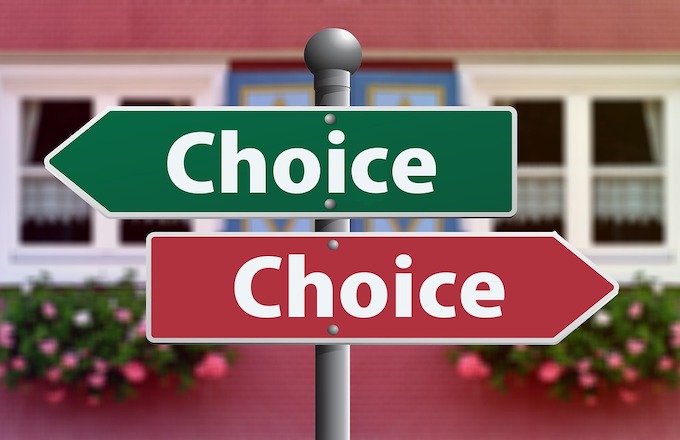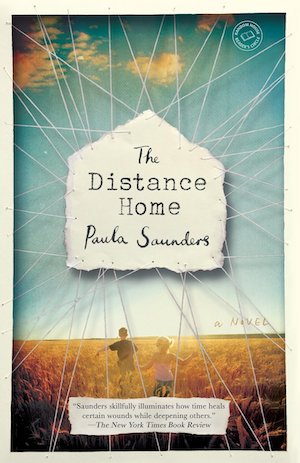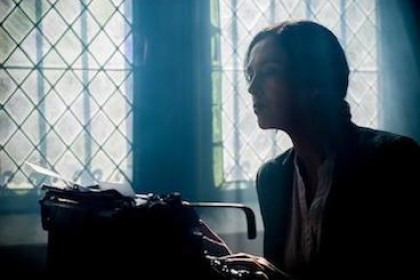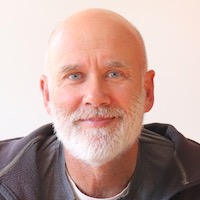12+ In a recent blog post, Repurposed Writing (August 2019), I discussed how I'd repurposed a short story written for a writer's circle in the early-1990s. The tutor panned it at the time as "too vague", but I still liked aspects of the writing. So I cut out the "vague" bits and changed the tense from past to present for more immediacy.
After publishing Escape to the Beach on Tall And True, I mentioned how I'd changed the tense to a writer friend. There was a sharp intake of breath, and he commented it must have been a chore. Fortunately, not, because it was a short-short story, microfiction, so it didn't take long to edit.
But then I heard a Better Reading Podcast interview (September 2019) with the American author Paula Saunders, who talked about the journey of writing her debut novel, The Distance Home (Random House 2019).
When I thought I'd finished the first time, I sent it to Toni Morrison for a reading. She got back to me with an email, five or six sentences only. And by reading that email, I understood what I needed to do was switch this three-hundred-plus-page book from first-person to third-person. And yes, that was another year of work.
Changing the tense of my short story was simple. However, Paula Saunders' task in changing her novel's point of view was epic. And it got me wondering. Could I change the point of view in my story? And where would I start?
Points of View Defined
Allen & Unwin Book Publishers offers a helpful resource for aspiring writers on their website, called the Writing Centre. Under Tips on Technique, there are extracts by published writers on point of view, including this advice from Kate Grenville, author of The Writing Book (Allen & Unwin 2010):
Points of view can be endlessly categorised, from 'first-person limited' to 'dramatic third-person omniscient' and everywhere in between. A more practical way of thinking about point of view is to ask these questions about the piece:
- who's telling the story
- how much do they know
- are they telling the truth?
The point of view in my short story is third-person, focusing on the protagonist and her thoughts. I set myself the challenge of doing the opposite of Paula Saunders and rewriting the piece in first-person.
As with changing the tense, I was grateful my story was microfiction and not a three-hundred-plus-page book! And the exercise gave me insight into Paula Saunders' decision to rewrite her novel in third-person. In my opinion, my writing lost its impact when told in first-person, as I think a comparison of the first paragraphs proves.
Original Third-Person Point of View
The golden sand squeaks in soft protest as Megan presses her body into the beach towel. A gentle breeze carries the taste of the sea and cools the sweat tingling her sun-baked skin. Distant gulls crawk and nearby waves roll onto the shore in a relaxing rhythm. Megan licks her lips and sighs. And then the phone rings.
Megan clenches her teeth and waits for her husband to respond to the rude interruption. The phone drones on.
"Answer it, Edward!" she explodes, opening her eyes and turning towards him.
The beach vanishes, the phone keeps ringing. Megan groans, switches on her bedside lamp and reaches across Edward's vacant side of the bed for the phone.
"Hello, who's calling, please?" she asks, rubbing the sleep from her eyes and squinting at the alarm clock on the bedside table. 2 AM.
"Is that you, Meg?" asks a young woman with a familiar faux American accent. Megan's face flushes hot — she is suddenly wide awake.
Edited First-Person Point of View
The golden sand squeaks in soft protest as I press my body into the beach towel. A gentle breeze carries the taste of the sea and cools the sweat tingling my sun-baked skin. Distant gulls crawk and nearby waves roll onto the shore in a relaxing rhythm. I lick my lips and sigh. And then the phone rings.
I clench my teeth and wait for my husband to respond to the rude interruption. The phone drones on.
"Answer it, Edward!" I explode, opening my eyes and turning towards him.
The beach vanishes, the phone keeps ringing. I groan, switch on my bedside lamp and reach across Edward's vacant side of the bed for the phone.
"Hello, who's calling, please?" I ask, rubbing the sleep from my eyes and squinting at the alarm clock on the bedside table. 2 AM.
"Is that you, Meg?" asks a young woman with a familiar faux American accent. My face flushes hot — I am suddenly wide awake.
Kate Grenville observes on the Writing Centre website: "The point of view in which you first write your story might not be the most dramatic [one] for it." And this was the case for Paula Saunders and The Distance Home.
LOVE WRITING?
Share and showcase your writing — fiction, nonfiction and reviews — as a Guest Writer on Tall And True.
And having experimented with points of view in my humble short story, it's something for me to bear in mind with my writing. Or should I say, it's something for Robert to bear in mind with his writing?
© 2019 Robert Fairhead
With thanks to Gerd Altmann for the Choice image from Pixabay.
N.B. If you're interested in more Writing Tips, you might like to read, An Editor's Magic Touch (May 2018). And Escape to the Beach is also now available as a Tall And True Short Reads podcast episode.
Robert is a writer and editor at Tall And True and blogs on his eponymous website, RobertFairhead.com. He also writes and narrates episodes for the Tall And True Short Reads storytelling podcast, featuring his short stories, blog posts and other writing from Tall And True.
Robert's book reviews and other writing have appeared in print and online media. In 2020, he published his début collection of short stories, Both Sides of the Story. In 2021, Robert published his first twelve short stories for the Furious Fiction writing competition, Twelve Furious Months, and in 2022, his second collection of Furious Fictions, Twelve More Furious Months. And in 2023, he published an anthology of his microfiction, Tall And True Microfiction.
Besides writing, Robert's favourite pastimes include reading, watching Aussie Rules football with his son and walking his dog.
He has also enjoyed a one-night stand as a stand-up comic.


 Browse & Buy on Amazon.com.au
Browse & Buy on Amazon.com.au

